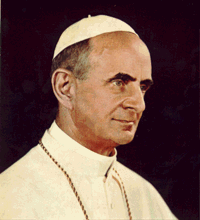“The Church, having received this preaching and this faith, although she is disseminated throughout the whole world, yet guarded it, as if she occupied but one house. She likewise believes these things just as if she had but one soul and one and the same heart and harmoniously she proclaims them and teaches them and hands them down, as if she possessed but one mouth. For, while the languages of the world are diverse, nevertheless, the authority of the Tradition is one and the same.”
—St. Irenaeus Against Heresies 1, 10, 2, c. AD 190
Occupying One House
I’ve been thinking about faith and the Church lately, I tend to do that a lot around Christmas time. It’s been especially important this year because of all the hubbub over Pope Francis rather unpredictable activities over the past year, especially the bungled Extraordinary Synod in October. The result of all this is that I’m reminding myself once again that my faith isn’t in the pope, he is human and can make mistakes. Rather, my faith is in the person of Jesus, whom I know about through occupying the one house St. Irenaeus wrote about all those years ago. It is the Church, the one house, that has custody of the preaching and faith that has been handed down to her and she has faithfully guarded. True, there have been momentary blips in time, I think we’re experiencing one now, where things seem dismal, but looking over the entire history of the Church, she has never wavered from the truth that, “the authority of the Tradition is one and the same,” it cannot change. I believe we can trust this to be true because, looking back from the beginning, despite detours along the way, the Tradition handed on by the Church has not changed.
Occupying One House
 I’ve only just begun reading Newman’s An Essay on the Development of Christian Doctrine for the first time. I think, from the little I’ve read so far, this is what Newman is saying. He starts right off with the statement that the Christian religion is a historical fact. He means, I believe, that there is written record of the faith going back to the time of Christ and that the teachings of the Church have been written about since that time and those writings still exist. One common argument made by non-Catholics is that, somehow, at some time, the belief and practices of the very early Church were adulterated, changed and diluted and the practices of the Church today bear no relationship to them. They constantly long to return to the “first century church.”
I’ve only just begun reading Newman’s An Essay on the Development of Christian Doctrine for the first time. I think, from the little I’ve read so far, this is what Newman is saying. He starts right off with the statement that the Christian religion is a historical fact. He means, I believe, that there is written record of the faith going back to the time of Christ and that the teachings of the Church have been written about since that time and those writings still exist. One common argument made by non-Catholics is that, somehow, at some time, the belief and practices of the very early Church were adulterated, changed and diluted and the practices of the Church today bear no relationship to them. They constantly long to return to the “first century church.”
I’ve long thought that, if you’re going to make that argument, you need to be able to document who made the changes, what changes were made, and when they were made. There is enough of a written record that exists to do so. Yet, it isn’t commonly done because it can’t be, the record doesn’t support that claim; those who make those kinds of arguments are forced to ignore history. It’s especially interesting that Newman looks at history and not the Church Fathers because individual fathers can be contradictory of each other and some even seem to support teachings we now recognized as heresies; the lived out Tradition of the Church holds the key. Newman, I think, is taking the longer view that history offers; he makes that explicit in a famous quote:
“It is melancholy to say it, but the chief, perhaps the only English writer who has any claim to be considered an ecclesiastical historian, is the unbeliever Gibbon. To be deep in history is to cease to be a Protestant.”
Occupying One House
In this Christmas season, we look back at the birth of the Child in Bethlehem, we celebrate a historical event in Salvation History. But it’s important also to look forward in our own lives and the life of the world and do our best to remain faithful stewards of the faith. That is the best way to ensure we continue to live out the reality of occupying the one house of faith in Jesus Christ.








